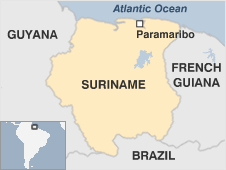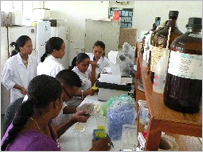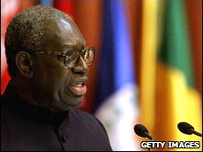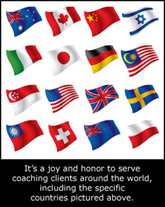 Country profile: Suriname
Country profile: Suriname

The Ministry of Public Health is responsible for the central coordination of a national health care system in Suriname.
The process to improve and enhance the health information systems infrastructure for more effective use of data and information to ultimately improve the well-being of the population will require strong leadership and will involve the full participation and commitment of all stakeholders to work together to improve the health information system for the benefit of the people of Suriname.
Suriname once known as Dutch Guiana is one of South America's smallest countries. It enjoys a relatively high standard of living but also faces serious political and economic challenges .
.
Since independence from the Netherlands in 1975 Suriname has endured coups and a civil war. Former military strongman Desi Bouterse dominated politics for much of the post-independence era but the country is now under civilian rule.
Overview
Suriname is one of the most ethnically diverse countries in the Americas. Most of its people are descended from African slaves and Indian and Indonesian indentured servants brought over by the Dutch to work as agricultural labourers.
However there is little assimilation between the different ethnic groups which confine their contacts to the economic sphere. Similarly most political parties are ethnically based. This acts as an obstacle to consensus-building.
Suriname has potential for tourism boasting rainforests abundant wildlife and colonial architecture in the capital. But the sector is undeveloped hampered by the inaccessibility of the interior and the lack of infrastructure. So Suriname depends heavily on mining and processing its declining reserves of bauxite and is vulnerable to falls in commodity prices.
Suriname and neighbouring Guyana have been engaged in a long-running territorial dispute over a potentially oil-rich offshore area. A UN tribunal settled the issue in 2007 redrawing the maritime border and giving both countries access to the basin. The ruling is expected to bring a surge of exploration by major oil companies.
The issue flared up in 2000 when Surinamese patrol boats evicted a Canadian-owned rig from a concession awarded by Guyana.
Facts
- Overview
- Facts
- Leaders
- Media

laboratory in Surinam
In 2008, Surinam decided to start a project that would lead to an efficient and international accepted animal health monitor.
|
- Full name: Republic of Suriname
- Population: 519000 (UN 2009)
- Capital: Paramaribo
- Area: 163265 sq km (63037 sq miles)
- Major languages: Dutch (official) English Sranang Tongo Hindi Javanese
- Major religions: Hinduism Islam Christianity
- Life expectancy: 65 years (men) 73 years (women) (UN)
- Monetary unit: Suriname dollar
- Main exports: Bauxite alumina aluminium crude oil timber shrimp and fish rice bananas
- GNI per capita: US $4990 (World Bank 2008)
- Internet domain: .sr
- International dialling code: +597
Leaders
President: Ronald Venetiaan
Ronald Venetiaan was re-elected in August 2005 by members of a regional assembly ending months of political deadlock.

President Venetiaan: Credited with containing inflation
|
Neither he nor his rival had received enough votes in parliament to become president. It was left to the regional body to decide the outcome.
Mr Venetiaan's New Front coalition returned the greatest number of MPs in May's parliamentary elections but not the majority it needed to govern. The poll was contested by the National Democratic Party of former dictator Desi Bouterse which doubled its representation.
This is Ronald Venetiaan's third stint as president. In 2000 he replaced Jules Wijdenbosch known as "Boschje" who oversaw a period of high public spending.
He inherited a devalued currency high inflation a collapsing health system and a bloated bureaucracy. Emergency measures were introduced to contain inflation and stabilise the exchange rate.
The government cut public spending and restructured the banana industry with the help of international loans.
In his first term from 1991-96 Mr Venetiaan ran an austerity programme which though unpopular left Suriname with a stable currency and a budget surplus.
Media
The government generally respects freedom of expression and on the whole the state broadcast media offer a range of views.
The two daily newspapers are privately-owned. State-run broadcasters operate alongside private radio and TV stations.
The press
Television
- Algemene Televisie Verzorging (ATV) - government-owned commercial broadcasting in Dutch English Portuguese Spanish and some local languages
- Surinaamse Televisie Stichting (STVS) - government-owned commercial broadcasting in Dutch English and some local languages
Radio
- Radio Apintie - commercial broadcasting in Dutch and some local languages
- Radio Nickerie (RANI) - commercial broadcasting in Hindi and Dutch
- Radio Paramaribo - commercial broadcasting in Dutch and some local languages
- Radio Radhika - broadcasts in Dutch and Hindi
- Radio Sangeet Mala - broadcasts in Dutch and Hindi
- Stichting Radio Omroep Suriname (SRS) - government-owned commercial broadcasting in Dutch and some local languages
-
Radio ABC - commercial

AFRICA | ASIA-PACIFIC | AMERICAS | EUROPE | MIDDLEEAST | SOUTHASIA



Mauritania Mauritius Morocco Mozambique Namibia Niger Nigeria Republic-of-congo Rwanda Sao-tome-and-principe Senegal Seychelles Sierra-leone Somalia South-africa Sudan Swaziland Tanzania The-gambia Togo Tunisia Uganda Australia Brunei Burma Cambodia China East-timor Fiji Indonesia Japan Kazakhstan Kiribati Kyrgyzstan Laos Malaysia Marshall-islands Micronesia Mongolia Nauru New-zealand North-korea Palau Papua-new-guinea Samoa Singapore Solomon-islands South-korea Taiwan Tajikistan Thailand The-philippines Tonga Turkmenistan Tuvalu Uzbekistan Vanuatu Vietnam Antigua-and-barbuda Belize Bolivia Brazil Canada Chile Colombia Costa-rica Cuba Dominica Dominican-republic Ecuador El-salvador Grenada Guatemala Guyana Haiti Honduras Jamaica Mexico Nicaragua St-kitts-and-nevis St-lucia Suriname Trinidad-and-tobago Uruguay Venezuela Albania Andorra Armenia Austria Azerbaijan Belarus Belgium Bosnia-hercegovina Bulgaria Croatia Cyprus Czech-republic Denmark Estonia Finland France Georgia Germany Greece Hungary Iceland Ireland Italy Latvia Liechtenstein Lithuania Luxembourg Macedonia Malta Moldova Monaco Montenegro Norway Poland Portugal Russia San-marino Serbia Slovakia Slovenia Spain Sweden Algeria Egypt Iran Iraq Israel-and-palestinian-territories Jordan Kuwait Lebanon Libya Mauritania Oman Saudi-arabia Sudan Syria Tunisia United-arab-emirates Yemen Afghanistan Bangladesh Bhutan India Nepal Pakistan Sri-Lanka The-Maldive

 .
.



